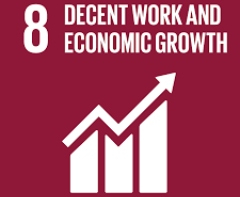.jpg)
Influencing international and national employment policies to promote inclusive labour markets
Across the world there is a need for more inclusive labour markets, promoted through policies to raise minimum wages, widen collective bargaining coverage, extend rights to precarious workers and to close gender pay gaps. The University of Manchester's work is providing an evidence base to inform these employment debates and policies.
This work delivers on the UN Sustainable Development Goal 8: promote sustained, inclusive and sustainable economic growth, full and productive employment and decent work for all.
Key facts
- Influenced guidance produced by several high-profile international policy bodies
- Shaped the national employment policies of many countries
- Provided evidence and arguments used by European trade unions in their interactions with EU and national policymakers
Shaping the global debate
More inclusive labour markets have positive benefits for workers and can help sustain more productive societies and create fairer labour markets.
Research by the Work and Equalities Institute (WEI) at Alliance Manchester Business School has influenced the guidance produced by several high-profile international policy bodies, shaped the national policies of multiple countries, and provided evidence and arguments used by European trade unions in their interactions with EU and national policymakers.
Minimum wage and collective bargaining
The analysis of the impact of minimum wages across six European countries provided new empirical evidence on the scope for links between minimum wages and collective wage bargaining, as well as the impact of minimum wages on pay equality, particularly gender pay equality.
In South Africa, WEI research helped make the case for a national minimum wage and in Greece, a WEI/ILO report on collective bargaining was used directly in discussions between the government and EU and IMF policymakers. In Portugal, research on changes in collective bargaining contributed to a report on decent work.
The gender pay gap
A cross-national study into collective bargaining under austerity analysed data from seven European countries that were heavily affected by the financial crisis of 2008. The study highlighted the costs of dismantling more coordinated systems of labour relations and regulation: lower wages; longer working hours; more inequality; and less social cohesion for workers.
Decent work is essential for a productive and thriving society and more inclusive labour markets provide a conducive context to the achievement of other objectives such as gender pay equality. The research has been widely cited and used by international policy organisations such as the International Labour Organisation, the European Commission and European Parliament, and The European Trade Union Institute.
Professor Jill Rubery / Director of the Work and Equalities Institute
Drawing on insights, a further study developed a new conceptual framework for closing the gender pay gap. It identified how developing labour markets that are more inclusive, more egalitarian, and more transparent is a prior condition for effective policies to close the gap.
Precarious work
The research of gaps in employment and social protection for people in precarious work provided evidence on the scope for legal measures and social dialogue in reducing those gaps and creating more inclusive labour markets.
In Greece, a WEI/ILO report on collective bargaining was used directly in discussions between the government and EU and IMF policymakers. Research by the WEI into temporary contracts and precarious work helped the European Parliament in its work in understanding how EU labour law and fundamental rights frame policies for combating precarious work and promoting inclusive labour markets.
Supporting researchers
Connected activity
- Closing the gender pay gap: A review of the issues, policy mechanisms and international evidence
- Challenges and contradictions in the ‘normalising’ of precarious work
- Evaluating the effects of the structural labour market reforms on collective bargaining in Greece (International Labour Office report)
- Temporary contracts, precarious employment, employees’ fundamental rights and EU employment law (study commissioned by the European Parliament)
- Making Work More Equal (open access book)


